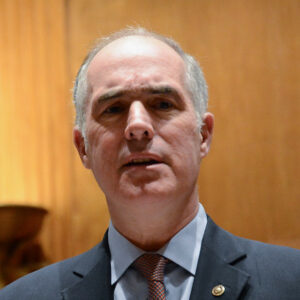Pennsylvania Sens. Bob Casey and John Fetterman are among the Democrats who are sponsoring the re-introduction of the so-called “Freedom to Vote Act,” a sweeping federal law that would override the Keystone State’s election rules. From requiring early voting to preventing voter ID mandates, the Casey-backed bill would impose federal requirements on locally-run elections, substituting national rules for those enacted by Pennsylvania lawmakers.
“I don’t have to tell you how transformational our legislation is,” Senate Majority Leader Chuck Schumer said at a Capitol Hill press conference last week. “The Freedom to Vote Act would fundamentally right size our democracy, advancing access to the ballot, ending the scourge of concentrated money in our politics, and giving voice to everyday Americans.”
The act is the U.S. Senate’s version of the “For The People Act,” also known as H.R.1, passed by then-Speaker Nancy Pelosi and the Democratic-controlled House in 2021. The bill was approved without any GOP votes while having the support of every Pennsylvania Democrat. Now Democrats in both chambers are backing the Senate’s version of the bill expanding federal control over state election laws.
Reps. Madeleine Dean (D-Montgomery) and Mary Gay Scanlon (D-Philadelphia/Delaware) declined to respond to questions about their support for the bill. A spokeswoman for Rep. Chrissy Houlahan (D-Berks/Chester) said she supports it but did not join the effort as a cosponsor because it is not “bipartisan.”
When the House passed its version of the bill in 2021, Scanlon made it clear she wanted the federal government to override elected legislators in Harrisburg.
“The Freedom to Vote: John R. Lewis Act protects our democracy by preventing state legislatures, like the Pennsylvania General Assembly, from making it harder for Americans to vote. This bill sets minimum standards which the states must meet — because so many have not.”
And Casey was particularly outspoken when the bill failed in the Senate, suggesting opponents were protecting “white supremacy.” In a 2021 interview, Casey said election reforms in states like Georgia’s were “voter suppression bills.”
“At its core, we should just be blunt about this; these voter suppression bills are about white supremacy,” Casey said.
(Georgia set a voter turnout record in 2022 under the new laws Democrats opposed, and Black voters told pollsters their voting experience was overwhelmingly positive.)
Opponents of the bill say states should control elections as outlined in the Constitution. They also argue that some of the requirements of the federal proposal are unpopular with voters. Among the bill’s mandates:
— Require Pennsylvania to have at least 13 days of early voting, including weekends, and to count ballots that come in late;
— Give millions of public dollars to political candidates to use on campaign staff, TV ads, attack mailers, etc.
–Allow felons to vote. Voting Rights Restoration for “Returning Citizens;” Restores the right to vote in federal elections for people who have served their time for felony convictions after being released from prison.
The bill’s advocates acknowledge it would require states like Pennsylvania to have both online voter registration and same-day voter registration, all without voter ID. Instead of proof of identification, the voting bill says state election officials “shall treat an individual desiring to vote in person in an election for Federal office as meeting such voter identification requirement if the individual presents the appropriate State or local election official with a sworn written statement, signed in the presence of the official by an adult who has known the individual for at least six months under penalty of perjury, attesting to the individual’s identity.”
Critics say that allowing voters without identification to simply present a signed document from someone who claims to know them would not inspire confidence in ballot integrity.
“This legislation eviscerates voter ID, opens the door for non-citizens to vote, and makes voting less transparent. Polling shows that Americans don’t want far left Democrats like John Fetterman and Bob Casey to seize control of local elections, and that’s why the ‘Freedom to Cheat Act’ will fail again,” said Republican National Committee spokesman Gates McGavick.
According to a Gallup poll taken last year, 79 percent of Americans support requiring a photo ID in order to vote.
Please follow DVJournal on social media: Twitter@DVJournal or Facebook.com/DelawareValleyJournal

